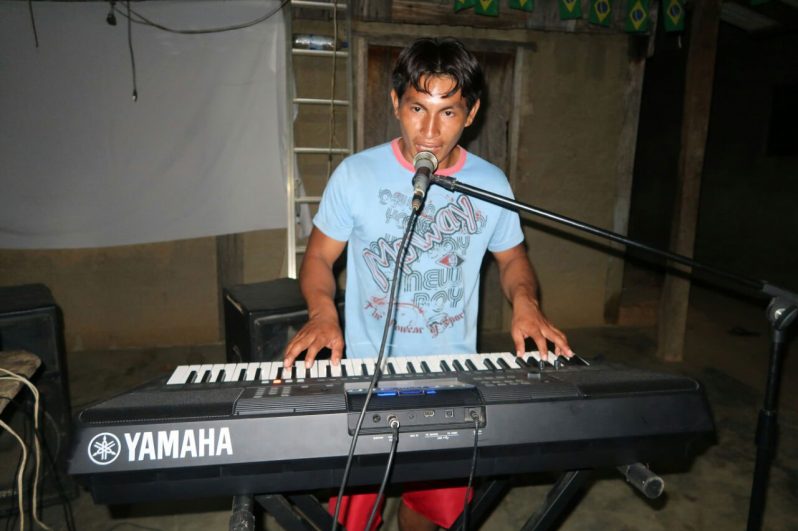By Ravena Gildharie
Makushi brothers launch first modern band in the Pakaraimas

DEEP in the heart of the Patamona and Makushi district in the North Pakaraimas, three Makushi brothers in the village of Kanapang have combined their musical talents to form what they claim is the first modern live entertainment band to emerge from that part of Guyana. With the use of modern instruments, the brothers are focused on making music that can showcase their rich indigenous culture and traditions practiced in the renowned Pakaraimas district.
‘Kanapang Boys – Pakaraimas Juice’ was launched in August 2017, founded by the youngest of the Lewis siblings, Phillip, a 22-year-old farmer, who developed a passion for music since a tender age. Kanapang is bordered by Brazil and Phillip got the opportunity to develop his keyboard and guitar skills through practice with bands from the neighbouring country until he encouraged his brothers to acquire their own instruments and form the band.

Today, the boys perform live and on-stage with Phillip skilled at the keyboard and also as the lead singer alongside his elder brother, 24-year-old Charles, who is currently serving as Kanapang’s Toshao. The older Lewis sibling, James, 33, has mastered his skills at the bass guitar. The brothers are from a larger family of 11 siblings born to a generation of Kanapang’s earliest settlers.
Charles highlighted that music runs in the family as an older cousin, Anthony Clement, is a well-known keyboard player from the community who mastered his instrumental skills in Brazil where he mostly performs. It was Clement who initially taught Phillip to use the keyboard and coached him as he developed his singing talent.
Due to Kanapang’s close proximity to Brazil, most villagers look to social services and entertainment from across the border. Some of the students even attend school in the Portuguese-speaking country.
However, all three of the Lewis musicians attended the Paramakatoi Secondary School situated in the nearby Pakaraimas community. Usually, they combine their ideas and talents to write and produce songs for the band to perform. Their songs are often based on the environment, events, activities and experiences that are mostly unique to the native people of the Pakaraimas.

According to Charles, the band has to date written and produced more than 15 songs, the most popular being ‘The Pakaraimas People,’ a composition that celebrates and showcases “the beauties of the Pakaraimas such as the mighty Kaieteur Falls, the mountains and the talented Patamona and Makushi people who live there.”
The group’s music mostly takes the form of reggae and the popular Brazilian Forró genre. The songs are composed and performed in English and Portuguese as well as the native Indigenous Makushi and Patamona dialects.
Since its launch, Charles said the band has been enjoying significant support, especially in the nearby Brazilian communities, with its most recent performance being last January in the town of Uiramutã, Roraima.
“That town has a population of about 4,000, and it was there we saw our largest ever crowd,” Charles told the Pepperpot Magazine, adding “we are usually invited to play at almost all events and occasions during the year.”
The band has gained popularity at private events too such as birthdays, weddings, parties and other social gatherings in Kanapang and nearby villages of the North Pakaraimas. A few months ago, Charles and Phillip took to the stage in Kato during a talent show to entertain a gathering of government officials, Toshaos and other community leaders who had gathered for a quarterly meeting.
Transportation, however, remains one of the band’s main challenges due to the difficulties in traversing the mountainous terrains. Looking ahead, ‘Kanapang Boys’ is hoping to promote their band and music nationally across Guyana with dreams of producing their own CDs/DVDs. However, a limited financial capacity of the musicians and lack of sponsorship to support these activities are daunting factors.
Nevertheless, the young men are determined to make their band known on a wider scale and expose their Indigenous culture and talents to Guyanese in all parts of the country.



.jpg)








